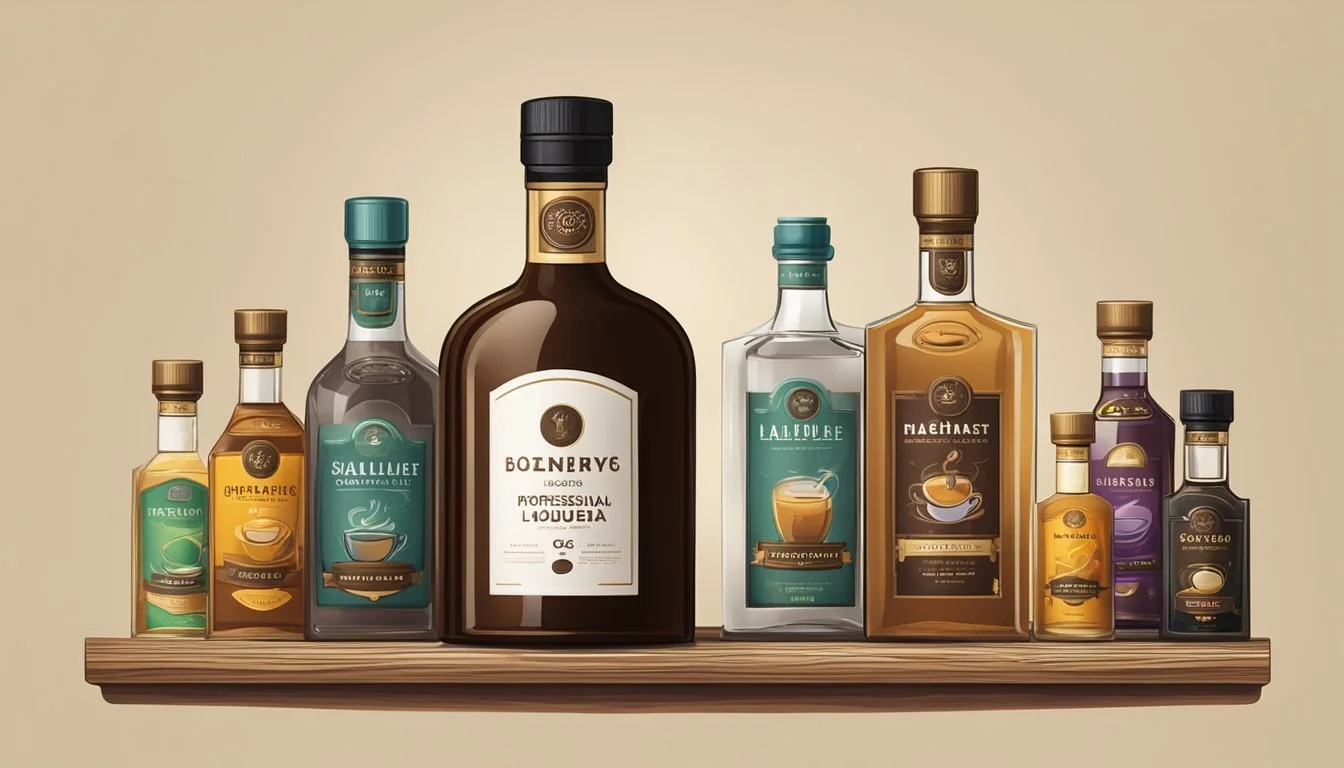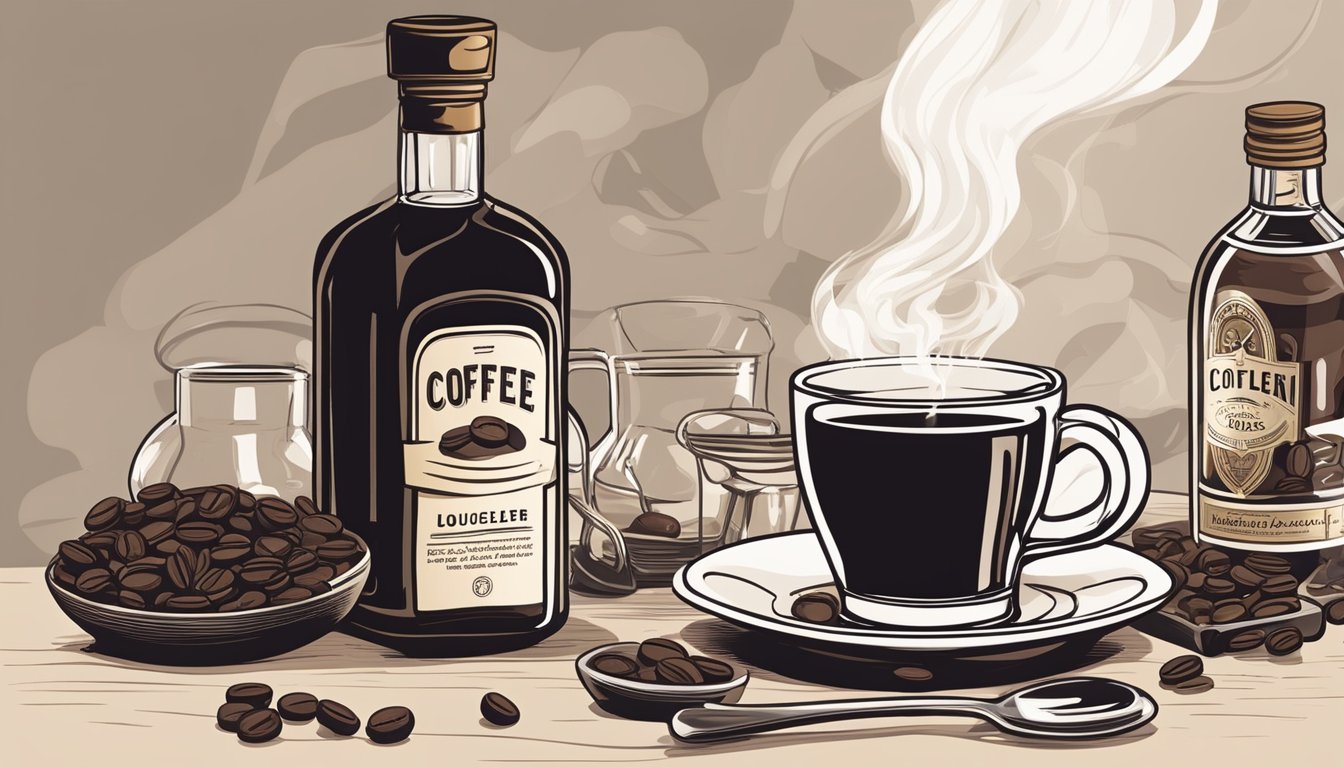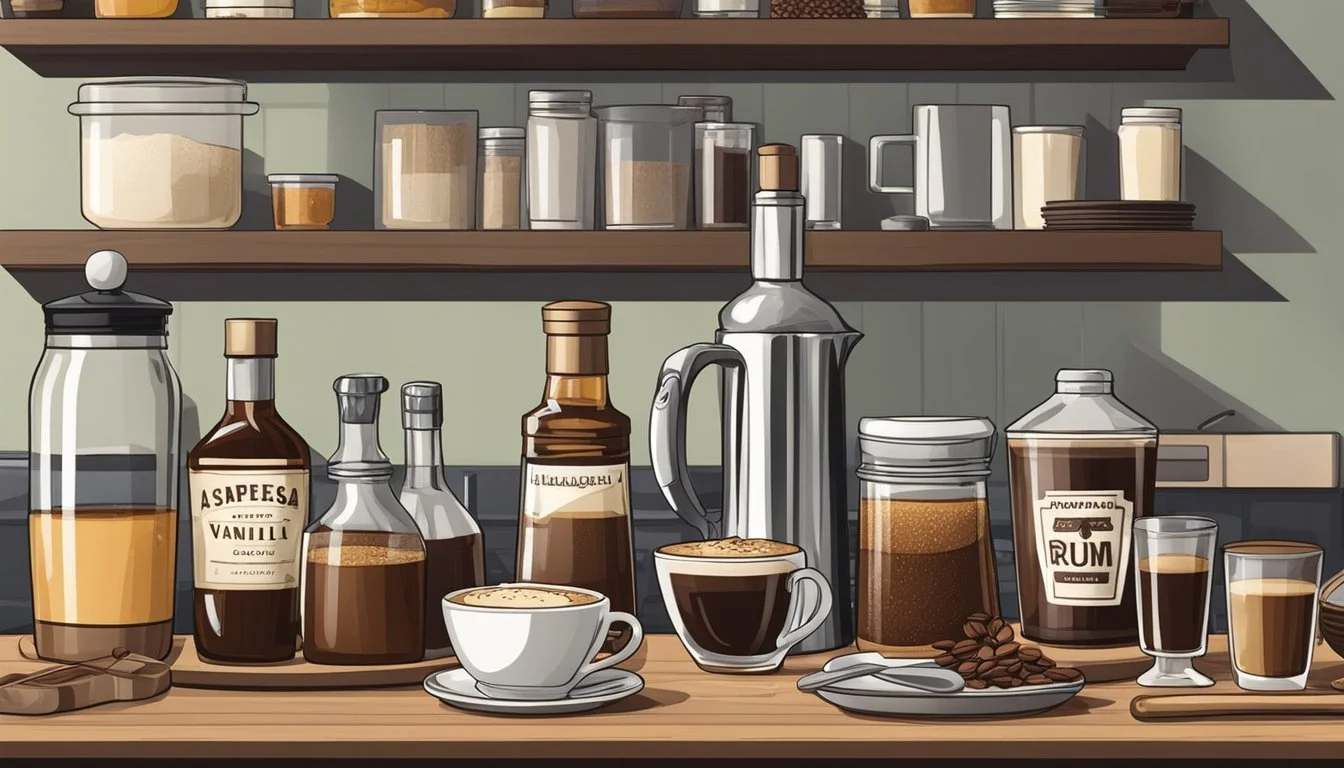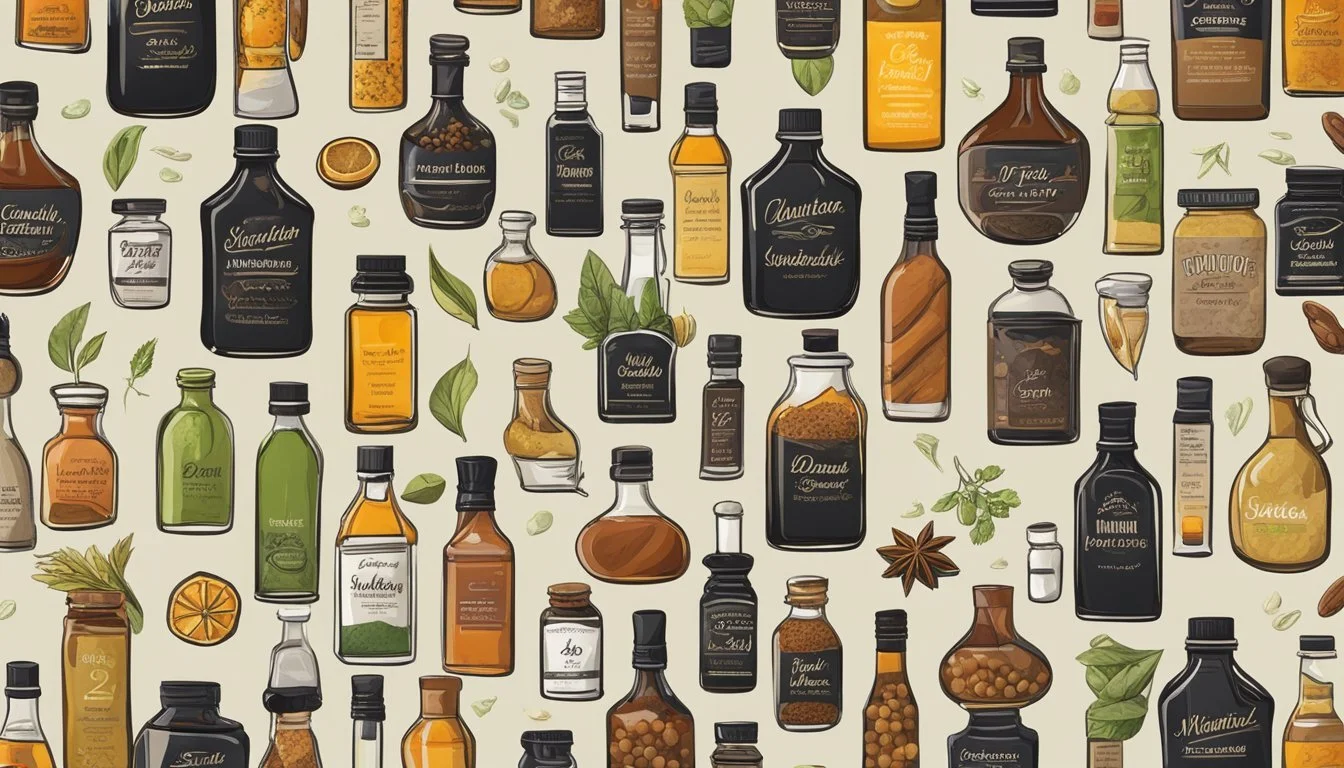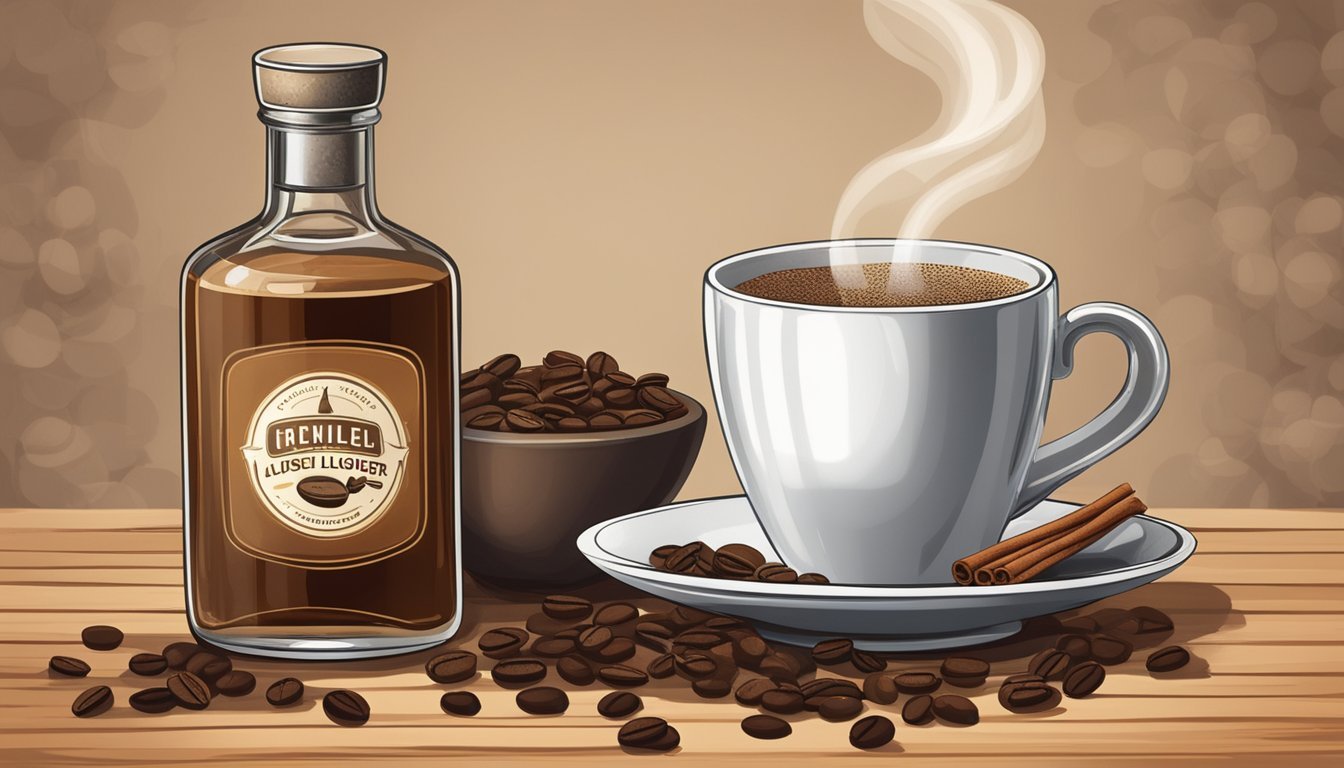Coffee Liqueur Substitutes
Top Alternatives for Your Recipes
Coffee liqueur is a popular ingredient in many desserts (What wine goes well with desserts?), cocktails, and coffee drinks, offering a rich, deep flavor that elevates the taste profile of any recipe it graces. However, there are reasons why one might seek an alternative to this sugary alcoholic mixer. Whether to avoid alcohol, reduce sugar intake, or simply due to availability issues, knowing non-alcoholic substitutes for coffee liqueur can be incredibly useful.
For those looking for non-alcoholic substitutes for coffee liqueur, options abound. Instant coffee mixed with a bit of chocolate extract, sugar, and water can provide a similar flavor profile. Alternatively, coffee-flavored syrup, made from coffee and sugar, offers the same rich taste and can be found in most grocery stores. Strong brewed coffee is another potential option that, when combined with a sweetener such as agave syrup, approximates the unique taste of traditional coffee liqueur.
On the other hand, if alcohol content is not a concern but one simply does not have coffee liqueur on hand, there are alcoholic alternatives that can step in. Spirits such as marsala, chocolate liqueur, and Frangelico bring their own distinctive flavors, while still complementing the coffee essence that is characteristic of coffee liqueurs like Kahlua and Tia Maria. Each substitute offers a nuanced experience that can cater to the specific demands of various recipes while keeping the essential coffee notes intact.
Understanding Coffee Liqueur
Coffee liqueur combines the complex flavors of coffee with the warmth of alcohol, resulting in a sweet and rich ingredient favored in various cocktails.
Key Ingredients
The primary ingredients of coffee liqueur include:
Coffee Beans: Provide the deep coffee flavor; may come from various regions to create specific taste profiles.
Alcohol: Acts as a base and preservative; its content varies by brand but typically ranges from 20% to 30% by volume.
Sugar: Adds sweetness that balances the bitter notes of coffee.
Water: Used to dilute and adjust the consistency.
Popular Coffee Liqueur Brands
Some of the most recognized brands of coffee liqueur are:
Kahlua: Originating from Mexico, known for its sweet and smooth flavor.
Tia Maria: A Jamaican liqueur with a slightly spicier and less sweet taste compared to Kahlua.
Common Uses in Cocktails
Coffee liqueur is versatile, used in a variety of cocktails such as:
White Russian: A creamy cocktail made with coffee liqueur, vodka, and cream or milk.
Espresso Martini: Combines coffee liqueur with vodka and espresso, garnished with a few coffee beans.
Black Russian: A simple mix of coffee liqueur and vodka, served over ice.
Irish Coffee: A warming beverage with coffee liqueur, hot coffee, Irish whiskey, and topped with cream.
Non-Alcoholic Substitutes
For individuals seeking to enjoy the rich flavors of coffee liqueur without the alcohol, various non-alcoholic substitutes can provide a similar taste experience. These alternatives range from commercial coffee-flavored syrups to creative homemade concoctions.
Coffee-Flavored Syrups
Coffee-flavored syrups serve as an ideal non-alcoholic alternative to coffee liqueur. They are sweetened syrups infused with coffee essence and available in most grocery stores. Coffee syrup can be used in beverages and desserts, directly replacing the coffee liqueur to achieve a similar flavor profile without any alcohol content.
Homemade Alternatives
Creating a homemade coffee liqueur substitute is simple. A popular option is to combine 1 cup of strong brewed coffee with 1 cup of granulated sugar and 1 teaspoon of vanilla extract. This mixture should be heated until the sugar dissolves, then cooled before use. For additional flavor depth, one might consider adding almond or rum extract.
Other Non-Alcoholic Options
Other non-alcoholic alternatives include chocolate syrup mixed with instant coffee or coffee extract, which replicates the richness of coffee liqueur. Vanilla and almond extracts can also be added to enhance the complexity of the flavors. These substitutes are versatile and can be adjusted according to personal taste preferences.
Alcoholic Alternatives
When looking for a substitute for coffee liqueur in a cocktail or recipe that still involves alcohol, one needs to consider the alcoholic content, flavor profile, and how it will interact with other ingredients.
Using Different Spirits
For those who prefer a different kind of kick in their drinks, opting for other spirits as a base can serve well. Rum is a primary constituent in many coffee liqueurs, thus using it as a substitute maintains the original character of the drink while letting you control the coffee infusion intensity. A vodka base is an excellent neutral canvas that can be infused with coffee and spices, offering a similar flavor experience with a personalized touch of coffee richness.
Liqueur Varieties
Liqueur Varieties bring depth and complexity to beverages, and substituting coffee liqueur with other types can add novel dimensions to traditional drinks.
Chocolate Liqueur: It provides a smooth, velvety consistency and can be used to add a rich, cocoa essence alongside the coffee flavors.
Irish Cream: This liqueur combines cream, Irish whiskey, and coffee flavors that can mimic the creamy texture of coffee liqueur.
Hazelnut Liqueur (like Frangelico): With its nutty flavor and slight sweetness, it's ideal for adding an unexpected twist to recipes that usually call for coffee liqueur.
Culinary Uses Beyond Cocktails
Coffee liqueur substitutes expand the range of flavors in desserts and savory cooking alike, opening up a world of culinary creativity without the alcohol content.
Desserts and Baked Goods
In the realm of sweets, coffee liqueur syrup and vanilla bean are key players. Chefs often incorporate these flavors into desserts such as tiramisu, where strong coffee notes are essential. The syrup can moisten ladyfingers and enrich the dessert's signature coffee taste.
Ice cream: Coffee liqueur syrup or a dash of chocolate extract can be swirled into homemade or store-bought ice cream to impart a rich coffee flavor.
Cheesecake: When baking a cheesecake, adding coffee liqueur syrup or a touch of chocolate extract can create a sophisticated mocha twist.
Truffles: For homemade truffles, a mixture of coffee syrup and chocolate extract gives a subtle liqueur-like essence without the alcohol.
In baking, these substitutes not only contribute flavor but also add moisture and depth to cakes and cookies.
Savory Cooking Applications
Beyond sweets, coffee flavors add complexity to savory dishes. Coffee liqueur syrup can be used in marinades to tenderize meats and impart a unique taste. It also works well in gravy to balance sweetness and acidity.
Marinades: Meat marinades benefiting from coffee notes can include a mixture of coffee liqueur syrup, spices, and a little chocolate extract for an extra dimension of flavor.
Gravy: A tablespoon of coffee liqueur syrup lends a rich, deep flavor to gravy, complementing dishes like roasted meats or poutine.
These substitutes offer versatility in cooking, allowing chefs to infuse coffee nuances into a wide array of dishes without using alcoholic ingredients.
Health and Dietary Considerations
When looking into non-alcoholic substitutes for coffee liqueur, it’s important to consider both the aim to reduce alcohol intake and the potential health benefits of non-alcoholic options. These alternatives cater to dietary restrictions while also offering a similar taste experience.
Reducing Alcohol Intake
Non-alcoholic substitutes for coffee liqueur enable individuals to enjoy the rich, deep flavors of coffee without the effects of alcohol. For those who are abstaining from alcohol for health, personal, or religious reasons, options like strong brewed coffee, coffee extract, and coffee-flavored syrup provide a safe and enjoyable alternative. Reducing alcohol intake can lead to better sleep, improved liver function, and decreased risk of developing certain diseases.
Strong brewed coffee
Calories: Minimal
Alcohol Content: 0%
Coffee extract
Calories: Low
Alcohol Content: 0%
Coffee-flavored syrup
Calories: Moderate (due to sugar content)
Alcohol Content: 0%
Benefits of Non-Alcoholic Options
The health benefits of non-alcoholic coffee liqueur substitutes are numerous. They retain the antioxidants found in coffee, which can combat oxidative stress and may lower the risk of certain conditions. Moreover, these substitutes are suitable for a wide range of dietary restrictions, including those for individuals with sensitivity to alcohol or those who follow a halal or teetotal lifestyle.
Antioxidants in coffee-based substitutes:
Protect cells from damage
May reduce inflammation
The substitutes also cut down the overall calorie and sugar intake when compared to traditional liqueurs, thus supporting dietary goals for weight management or reduced sugar consumption. Non-alcoholic options can offer a complexity of flavor with ingredients like vanilla or almond extract, without the need for alcohol.
Sustainability and Ethical Sourcing
Incorporating eco-friendly packaging, adhering to sustainable certifications, and engaging in fair trade practices are crucial for producers of ingredients such as green tea and chamomile tea, which are often used in crafting coffee liqueurs.
Eco-Friendly Packaging and Sourcing
Producers of organic teas including those used in coffee liqueur production are increasingly utilizing earth-friendly packaging. This involves biodegradable or recyclable materials, which significantly reduce the ecological footprint. Furthermore, organic tea subscription boxes often prioritize eco-friendly packaging, enhancing the appeal to environmentally conscious consumers.
Example of Sustainable Packaging: Cardboard boxes made from recycled materials.
Ingredient Sourcing: Organic farms supplying herbs like green tea and chamomile tea often use sustainable cultivation methods.
Certifications and Consumer Trust
Trustworthy organic tea certifications signify adherence to environmental and health standards.
Common Certifications:
USDA Organic
Fair Trade Certified
Rainforest Alliance Certified
These labels are frequently backed by third-party verification ensuring transparency and traceability. They offer consumers confidence in ethical sourcing and sustainability claims.
Fair Trade and Ethical Practices
Fair trade practices ensure that farmers and workers involved in producing organic teas receive fair wages and working conditions. By promoting ethical sourcing and production, the industry not only supports worker welfare but also encourages sustainable farming practices.
Direct Impact: Fair trade premium prices contribute to community development and sustainable livelihoods.
Holistic Approach: Ethical sourcing strategies often extend beyond fair trade to include conservation efforts and energy-efficient processes.
Exploring Unique Flavors and Customization
In the quest for the perfect coffee liqueur substitute, one may find an exciting realm of diverse flavors and the ability to customize to personal taste a fulfilling endeavor. Experimentation with a variety of teas and blending one’s own combinations can result in a bespoke concoction that elevates any recipe.
Diverse Selection of Teas and Infusions
A wide-ranging selection of teas can serve as an intriguing base for a non-alcoholic coffee liqueur substitute. The choice of tea affects the flavor profile and can be tailored to match the complexity and richness of traditional coffee liqueur. Options include:
Black Tea: Offers a strong, robust flavor akin to bold coffee notes.
Chai Tea: Brings in a spiced flavor that can complement the sweetness in recipes.
One can further explore the use of loose leaf teas, which often provide superior quality and unique flavor nuances.
Creating Your Own Blends
Customization allows individuals to create their own unique coffee liqueur alternative. Key considerations in crafting a homemade blend include:
Brewing Techniques: Methods such as steeping time and temperature can greatly alter the intensity and extraction of flavors.
Ingredient Ratios: Balancing components like sweetness and bitterness is critical.
One's own blends might integrate different elements such as vanilla extract or cocoa powder to achieve a desired profile. Customization not only caters to personal preference but also offers the opportunity to adapt to the specific requirements of a recipe.
Conclusion
When coffee liqueur is unavailable or undesirable due to its alcohol content, one has a variety of substitutes at their disposal. A popular choice is instant coffee, which offers a similar flavor profile. It can be mixed with a sweetener and chocolate extract to replicate the rich taste of the original liqueur. Coffee syrup is another alternative, lending sweetness along with the robust coffee flavor essential in many recipes.
The substitutes provide flexibility based on one's dietary preferences or pantry availability. For those seeking an alcohol-free option, the crafted mixtures using instant coffee or a strong brewed coffee base are ideal, often including ingredients such as sugar and vanilla extract for added depth.
Here's a quick reference for the discussed alternatives:
Instant Coffee Mixture:
1/2 tbsp instant coffee
1 tsp chocolate extract
1 tsp sugar
1 tsp water
Coffee Syrup:
Widely available
Alcohol-free
Sweetened coffee flavor
Users should consider the taste and consistency differences when choosing a substitute. While not identical, these alternatives provide a successful adaptation in both drink and culinary creations, ensuring the intended coffee flavor is maintained with or without alcohol.
In essence, the goal is to match the profile of coffee liqueur as closely as possible, and with these options, cooks and baristas can confidently achieve desired results.


